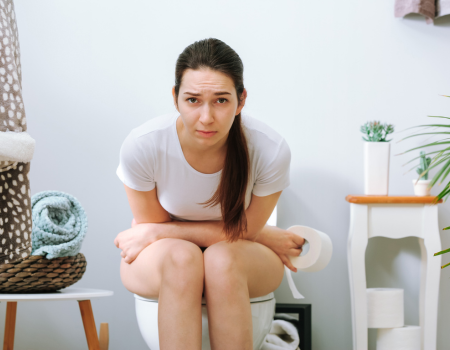
What is Constipation?
Constipation is a bowel dysfunction that makes bowel movements infrequent or hard to pass. The stool is often hard and dry. Other symptoms may include abdominal pain, bloating, and feeling as if one has not completely passed the bowel movement. It can be occasional or chronic, affecting daily comfort and overall health.

Common causes include low fiber intake, inadequate water consumption, lack of physical activity, certain medications, and stress. If left untreated, constipation may lead to complications like hemorrhoids, anal fissures, or fecal impaction. Making healthy lifestyle changes and seeking timely treatment can provide lasting relief.
Symptoms of Constipation
Symptoms of constipation include:
- Fewer than three stools a week.
- Hard, dry, or lumpy stools.
- Straining or pain when passing stools.
- A feeling that not all stool has passed.
- A feeling that the rectum is blocked.
- The need to use a finger to pass stool.
Chronic constipation is having two or more of these symptoms for three months or longer.
What is Chronic Constipation?
Chronic constipation means constipation that lasts for several weeks or keeps coming back frequently. Unlike occasional constipation, which is short-term, chronic constipation may indicate a deeper health problem or lifestyle issue. People with chronic constipation often experience long-term difficulty passing stools, incomplete evacuation, bloating, and abdominal pain. It can also increase the risk of hemorrhoids, anal fissures, or rectal prolapse. Causes may include ongoing poor diet, dehydration, stress, sedentary habits, or underlying medical conditions like thyroid disorders. Managing chronic constipation requires proper evaluation, lifestyle changes, and safe treatments like homeopathy to restore normal bowel function naturally.
Causes of Constipation
The causes of constipation can be divided into congenital, primary, and secondary. The most common kind is primary and not life-threatening. It can also be divided by the age group affected, such as children and adults.
Primary or functional constipation is defined by ongoing symptoms for greater than six months, not due to an underlying cause such as medication side effects or an underlying medical condition. It is not associated with abdominal pain, thus distinguishing it from irritable bowel syndrome. It is the most common kind of constipation and is often multifactorial. In adults, such primary causes include dietary choices such as insufficient dietary fiber or fluid intake, or behavioural causes such as decreased physical activity. In children, causes can include diets low in fiber and fluids, underlying medical conditions, and reluctance to go to the bathroom. In the elderly, common causes have been attributed to insufficient dietary fiber intake, inadequate fluid intake, decreased physical activity, side effects of medications, hypothyroidism, and obstruction by colorectal cancer.
Secondary causes include side effects of medications such as opiates, endocrine and metabolic disorders such as hypothyroidism, and obstruction, such as from colorectal cancer or ovarian cancer. Celiac disease and non-celiac gluten sensitivity may also present with constipation. Cystocele can develop as a result of chronic constipation.
How can constipation be prevented?
Constipation can often be prevented with simple lifestyle changes. Eating a fiber-rich diet, including fruits, vegetables, whole grains, and seeds ensures softer, bulkier stools. Drinking 7–8 glasses of water daily helps maintain hydration and smooth bowel movements. Regular physical activity stimulates digestion, while avoiding prolonged sitting supports gut health. Developing a regular toilet routine and not ignoring the urge to pass stool are also helpful. Stress management, yoga, and adequate sleep further support digestion. By following these habits, constipation can be prevented naturally. Homeopathy complements prevention by strengthening the digestive system and restoring long-term bowel balance.
- Complications- If left untreated, constipation can lead to:
- Hemorrhoids – due to straining
- Anal fissures – tears in the skin around the anus
- Fecal impaction – hardened stool stuck in the rectum
- Rectal prolapse – part of the rectum protrudes from the anus
- Chronic discomfort and pain
- Psychological effects – especially in children (e.g., anxiety about toileting)
The following tips can help you avoid developing constipation.
- Eat lots of high-fiber foods, including vegetables, fruits, beans, and whole-grain foods.
- Eat fewer foods with low amounts of fiber, such as processed foods, dairy, and meats.
- Drink plenty of fluids.
- Stay active and exercise regularly.
- Don’t ignore the urge to pass stool.
- Create a regular schedule for passing stool, especially after a meal.
What foods are good for constipation?
Diet plays a key role in relieving constipation. Foods rich in fiber and water content help soften stools and make bowel movements regular. Fruits like papaya, apple, pear, guava, and prunes are excellent choices. Vegetables such as spinach, broccoli, beans, and carrots support digestion. Whole grains like oats, brown rice, and multigrain bread improve stool bulk. Flaxseeds and chia seeds are natural laxatives that help ease constipation. Drinking enough water and including buttermilk or curd aids gut health. A balanced diet rich in natural foods, combined with regular exercise, is one of the best natural ways to fight constipation.
What foods worsen constipation?
Certain foods can make constipation worse by slowing digestion or producing hard stools. Low-fiber foods such as white bread, refined flour, and fast foods lack the roughage needed for easy bowel movements. Processed foods, fried snacks, and excessive red meat can also trigger constipation. Too much cheese, milk, or dairy products often worsens the condition. Sugary foods, chocolates, and packaged snacks also have poor digestive value. Low water intake further adds to the problem. Reducing these foods while increasing fiber, fluids, and fresh fruits can bring quick relief. Identifying and avoiding constipation-triggering foods is essential for prevention.
Does stress affect constipation?
Yes, stress directly affects digestion and can worsen constipation. When a person is under stress, the body releases hormones that slow down the digestive system, reducing intestinal contractions. This makes it harder for stools to move through the colon. Anxiety, depression, and irregular routines caused by stress also disrupt bowel habits. Many people with chronic stress experience constipation along with bloating or stomach discomfort. Practising relaxation techniques such as yoga, meditation, and deep breathing can help restore normal bowel function. Homeopathy also considers mental health factors while treating constipation, providing holistic relief for both mind and body.
Homeopathy for Constipation
Homeopathy offers a safe and natural way to manage constipation by addressing the root cause rather than just providing temporary relief. It considers an individual’s complete health picture, including digestion, lifestyle, and emotional well-being. Remedies are selected based on unique symptoms, such as hard stools, straining, or incomplete evacuation. Homoeopathy works gently to restore the body’s natural bowel function. It is suitable for all age groups, including children and the elderly. With individualised treatment, homeopathy helps improve digestion, reduce discomfort, and prevent the recurrence of chronic constipation naturally and effectively.
Benefits of Homoeopathy for Constipation
- Homoeopathic remedies are designed to stimulate the body’s natural healing processes, potentially reducing symptoms.
- Homoeopathic treatment focuses on holistic health, potentially preventing the progression of disease.
Homoeopathic Remedies for Constipation
Homoeopathy treats based on the totality of symptoms (physical, emotional, and behavioural).
Here are commonly used remedies:
- Nux Vomica- For a sedentary lifestyle, irregular diet, excessive use of stimulants, and straining.
- Bryonia Alba-Dry, hard stools; sluggish bowels; thirst for large amounts of water.
- Opium-Constipation with no urge; dry, hard, black stools; after surgery or immobility
- Silicea – Stool recedes after partially emerging; weak rectal muscles.
- Lycopodium- Bloating, flatulence, and incomplete stool feeling; worse in the evening.
- Plumbum Metallicum – Severe constipation with dry, knotty stools and colicky abdominal pain.
- Graphites – Constipation with anal fissures or hemorrhoids; stools are large and hard.
Remember, while these remedies have shown promise in treating constipation, it’s essential to work with a qualified homeopathic practitioner to develop a personalised treatment plan. With patience, consistency, and a holistic approach to health, many psoriasis patients find relief and improved quality of life through homeopathy.
Why choose Dr. Sanjay’s Homoeopathy for Constipation Treatment in Lucknow, India?
Dr. Sanjay’s Homoeopathy is a trusted clinic for safe and effective constipation treatment in Lucknow, India. With years of experience, Dr. Sanjay offers specialised constipation homeopathic treatment that provides lasting relief from hard stools, irregular bowel movements, abdominal pain, and discomfort without any side effects. As a leading homeopathic doctor in Lucknow, he follows international standards and provides personalised care to treat the root cause rather than just symptoms. Patients choose Dr. Sanjay’s Homoeopathy for its holistic healing approach, proven results, and compassionate patient care in managing both acute and chronic constipation.
Patients from across the world trust Dr. Sanjay’s Homoeopathy for Constipation Treatment in Lucknow, India. Dr. Sanjay Singh, who led this clinic, has successfully treated thousands of patients with Constipation, which makes him the best homeopathy doctor for constipation in Lucknow, India.


